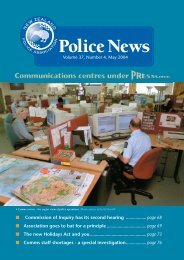âI'm No Heroâ - New Zealand Police Association
âI'm No Heroâ - New Zealand Police Association
âI'm No Heroâ - New Zealand Police Association
Create successful ePaper yourself
Turn your PDF publications into a flip-book with our unique Google optimized e-Paper software.
<strong>New</strong> <strong>Zealand</strong> <strong>Police</strong> <strong>Association</strong> <strong>New</strong>sletter<strong>No</strong> <strong>Association</strong> Membership- <strong>No</strong> Legal AssistanceRecently a police officer applied to the<strong>Association</strong> for financial aid to helpfund his defence on an assault charge.The application was initially favourablyconsidered until a routine check atNational Office revealed that the officerwas not a member of the <strong>Association</strong>.The officer will now have to meet hisown costs, which could be in thevicinity of $20,000.This story underscores a vital fact:You must be a member ofthe <strong>Police</strong> <strong>Association</strong> toaccess the benefits of theLegal Assistance Scheme<strong>Police</strong> staff who join the <strong>Association</strong>within three months of joining the<strong>Police</strong> are eligible for legal assistance.However those staff who do not joinwithin that three month grace periodcannot receive legal assistance untilthey have been a member for sixconsecutive months.In other words, if you wait until youhave a reason for wanting <strong>Association</strong>help before you join, you are ‘stooddown’ from assistance until you havebeen a member for six months, (Rule7(a)).How do you class<strong>Association</strong> membership?Membership of the <strong>Police</strong> <strong>Association</strong>means financial membership in terms ofpayment of the <strong>Association</strong>’smembership fee - $16.50 per fortnightfor sworn and $10 per fortnight fornon-sworn members.A proportion of this subscription is setaside each fortnight for the LegalAssistance Fund, from which financialpayments are made to lawyersdefending members against chargesarising from their employment in <strong>Police</strong>.There is no adequate substitute for the<strong>Association</strong>’s Legal Assistance Schemeexcept self-insurance. If you are richenough to pay your own legal costscome what may, this may be a viableoption. However, for many this is notan option they can take their chanceswith, especially with the nature of<strong>Police</strong> work and the Administration’scrusade for the <strong>Police</strong> organisation tobe seen as ‘whiter than white’.<strong>No</strong> substitute for LegalAssistance FundFrom time to time the <strong>Association</strong>examines alternative ways of fundingthe Legal Assistance Scheme, such asan occupational insurance typearrangement. Every time suchalternatives have been looked atthey have turned out to be muchmore expensive than the currentarrangements.The reason for this is simply thenumber of uncontrolled anduncontrollable variables, which enterinto the policing occupation, makingit especially subject to judicial risk.These make the odds very hard tocalculate.A doctor in the operating room cansee to it that all the variables areknown and as many risks anticipatedas possible. So can a fire-fighter, orparamedic, or even a lawyer. Inother words, the legal risks for theseAre you Aware...- Ill on Holiday?<strong>No</strong>vember 2002occupations can be reasonably wellcontrolled.A member of police attending anincident or going about his or herwork cannot control their legal risksin exactly the same way. Splitsecond decisions are required insituations where there are bound tobe aggrieved individuals. Situations,which appear ‘normal’ can quicklychange into highly charged and evendangerous events and thesepossibilities do not cease for swornofficers when their work hours end.In short, so far no substitute hasbeen found for the <strong>Association</strong>’sLegal Assistance Scheme, whichremains a key benefit of<strong>Association</strong> membership.Code of Conduct Booklet Signed-offBy <strong>Association</strong> Industrial Officer, Kathy DrysdaleIn late September the Board of Commissioners endorsed the Sworn Code ofConduct Booklet. After much consultation with members on the draft throughJune of this year, the booklet was also ratified by the <strong>Association</strong>’s Board.Where to now?The change to a Code of Conduct system still depends on 2 things:• Completion of the Code Procedure Manual (the detailed guidance onoperating the Code system). We have received on-going guarantees thatthe project is not complete till the Manual is finalised.•The passing of the <strong>Police</strong> Amendment Bill. The Bill is currently at secondreading stage and is on the Parliamentary Order Paper. <strong>Police</strong> hope to havethe system “ready to go” when the Bill is passed.<strong>Association</strong> staff, are busy working on the Code Manual and when a draft hasbeen completed the key points will be circulated to members for feedback,before anything is agreed.We will also plan the implementation of the Code, as it may require trainingand information for both managers and members.For an overview of the Code of Conduct process and analysis of thefeedback on, see our website: www.policeassn.org.nzWith the Christmas holiday period approaching, some members will belucky enough to have been granted leave.Remember if you are on annual or shift leave and fall ill, you are entitled tohave the period from which you notify <strong>Police</strong> of your illness up until yourrecovery, counted as sick leave.It is important to note that you can’t just tell <strong>Police</strong> of your illness uponreturn to work and expect to have your annual leave reimbursed. You mustinform <strong>Police</strong> of your predicament at the time of your illness andproduce a medical certificate in due course.153

















